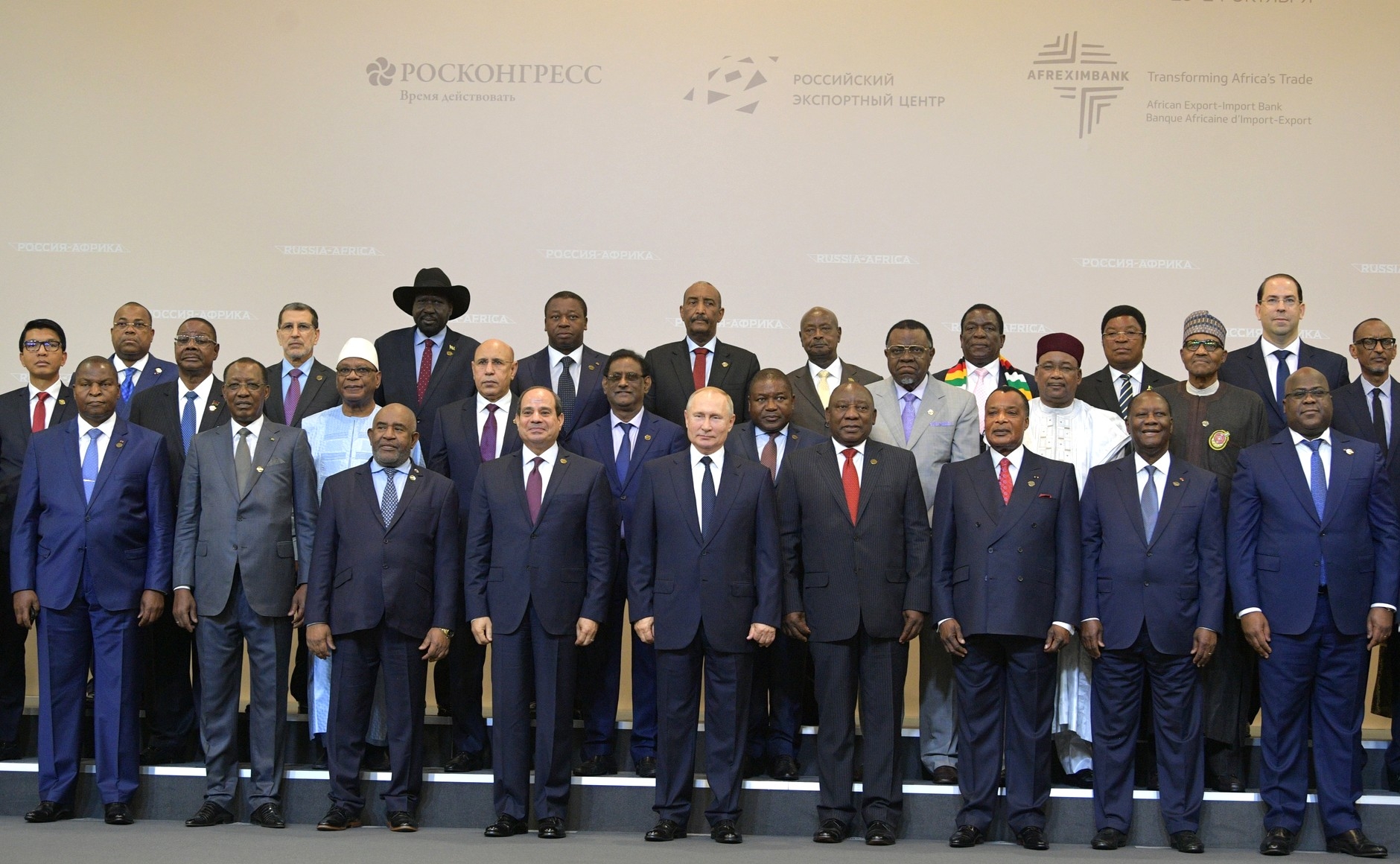 While the United States and France have been helping the fragile governments of Africa's Sahel region stave off Islamist terrorist attacks and takeovers, Russia has been busy trying to push NATO out of the area and augment its own influence there. Pictured: Russian President Vladimir Putin and African heads of state at the Russia-Africa Summit in Sochi, Russia, on October 24, 2019. (Image source: kremlin.ru) |
While the United States and France have been helping the fragile governments of Africa's Sahel region stave off Islamist terrorist attacks and takeovers, Russia has been busy trying to push NATO out of the area and augment its own influence there.
Moscow's strategy rests on three pillars. The first is the cultivation of relationships with African leaders, particularly those attempting to remain in power in spite of constitutional limitations — such as, for instance, Sudan's former dictator, Omar al-Bashir, who was recently ousted by oppositionists. The Kremlin dispatched several hundred paramilitary advisers in late 2018 to train the Sudanese military how to suppress protests.
Ultimately, Moscow's mission to boost al-Bashir failed; he was overthrown in April 2019, a few months later.
The second pillar is the insertion of Russian agents into the inner circle of rising African leaders, such as the young, recently elected president of Madagascar, Andry Rajoelina. This pillar is also likely at work in the Kremlin's penetration of Central African Republic (CAR) President Faustin Touadera's staff by the Russian security adviser, Valery Zakharov.
The third pillar involves arms sales: Moscow is the largest supplier of weapons to African countries. Russia, for instance, has been shipping arms to the weak administration of the CAR, which is trying to maintain a shaky truce between two ethnic groups that are responsible for considerable civil strife in recent years. The Kremlin has also inked arms deals with Nigeria and Sudan -- apparently hoping to develop long-term military relationships on the African continent as it has done with Algeria and Egypt.
These three pillars are reinforced by intelligence-gathering and the dissemination of anti-Western propaganda -- skills Russian President Vladimir Putin acquired and honed during his former career as a KGB officer. One of Moscow's current methods of fomenting anti-Western sentiment, for example, is to establish media sites, such as the Morocco-based web site "Africa Daily Voice" or the French-language news service, "Afrique Panorama," in Madagascar. The Kremlin has also sanctioned the broadcast of anti-French stories in the Comoros denouncing the alleged continued colonial influence in the country. Russian propagandists have used media projects like these to disparage Western presence in the Third World for decades and continue to test ways to spread conspiracy theories about the West's neo-colonial imperialism in Africa.
Putin's point man for the above tactics for influence in Africa is Yevgeny Prigozhin, a Russian oligarch who is a principal donor supporting the activities of Russia's paramilitary organization, "The Wagner Group," whose operatives were deployed as combatants in Crimea and Syria. Prigozhin -- who may be negotiating an arms deal with CAR authorities -- concluded a deal with the Libyan rebel General Khalifa Haftar, who leads a militia in Tobruk and aims to overthrow the internationally recognized government in Tripoli, Libya. Haftar claims that Moscow has sent hundreds of fighters to back his militia. While he may have been spreading disinformation about the presence of 300 Russian mercenaries, the Government of National Accord (GNA) in Tripoli nevertheless asserts that it is collecting evidence confirming the presence of these mercenaries. Putin denies having sent any Russians to Libya, but this does not mean that Russian mercenaries have not been contracted by the Wagner Group to help Haftar, or that Russia is being totally forthcoming.
The Russia-Africa Conference, Putin's high-profile diplomatic extravaganza on October 23-24 in the Black Sea resort of Sochi -- attended by more than 40 African heads of state -- seems a clear public expression of Putin's desire to exert influence on the African continent. During the event, he went as far as to make a point of cancelling all outstanding African debts to Russia, which amount to approximately $20 billion. Putin punctuated the occasion with a military show of force, by dispatching two nuclear-capable long-range bombers, and timing their landing in South Africa just as the conference convened.
Putin's Africa initiative can be viewed in the context of his Soviet past. The Russian president is likely aware of the USSR's potent presence in Africa during the Cold War. During the 1970s, Moscow concluded "treaties of friendship and cooperation" with Third World countries, among them African states, including Ethiopia, Angola and Mozambique. After the collapse of the Soviet Union, Moscow largely withdrew from the African continent, until Putin rekindled the flame about two years ago, in an attempt to restore Russia's "glory days" and fill a vacuum wherever one is created by the West.
There is nevertheless cause for cautious optimism. Today's Russia is financially less able than it was in the past to invest in non-military infrastructure projects, and Moscow's prospects for increased trade with Africa, beyond weapons sales, are dim in any case, as Russian-manufactured products cannot compete with those made in the US, Europe and China for quality. Even regarding weapons sales to Africa, Russia is outdone by China: Moscow is selling arms to 14 African states, while Beijing is selling arms to 23. In other words, Russia will not find it as easy to project super-power status, as it did during the Cold War.
Between Russia's expansionism in the region, and China's as well, the United States would do well to remain as vigilant as ever.
Dr. Lawrence A. Franklin was the Iran Desk Officer for Secretary of Defense Donald Rumsfeld. He also served on active duty with the U.S. Army and as a Colonel in the Air Force Reserve.


